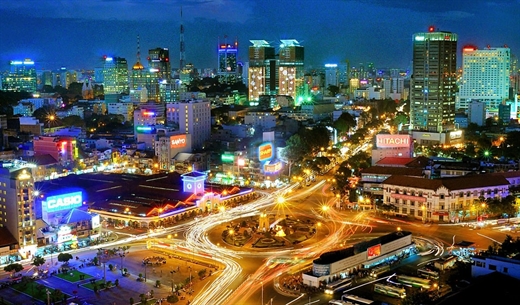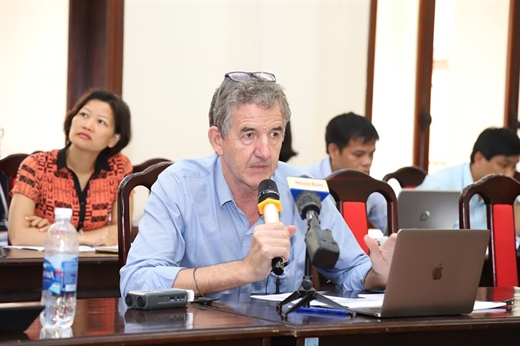Australia supports Economic Reform in Vietnam (Aus4Reform)
- en
- News and Media
- Aus4Reform News
- Economy expected to see brighter prospects
26/9/2018
Economy expected to see brighter prospects
Improved macro-economic foundations, together with strong investment levels and exports, are expected to continue helping to drive Vietnam’s growth forwards.
Economy expected to see brighter prospects
Improved macro-economic foundations, together with strong investment levels and exports, are expected to continue helping to drive Vietnam’s growth forwards.
 |
| Illustration image |
Recently, the ADB (The Asian Development Bank) issued its Asian Development Outlook Supplement report, with a projection that the country’s economic prospects will continue to be bright, at 7.1% in this year and 6.8% next year.
All economic sectors of the country are experiencing quicker growth in 2018 than in 2017. The index of industrial production has climbed to the highest eight-month level since 2011, at 11.2% annually, boosted by strong global demand for exports and continued foreign direct investment (FDI).
According to the General Statistics Office’s report, in this year’s first eight months, total retail and consumption services revenue rose to the highest eight-month level since 2015, at 11.2% annually, while agriculture almost doubled to 4.1% growth from 2.1% in the same period last year. With rising global interest in Vietnam as a destination for FDI, combined with recent progress on major trade deals, including the revised Comprehensive and Progressive Trans-Pacific Partnership, the outlook remains positive for this year and next.
Raymond Mallon, Senior Policy Advisor for the Australia-Vietnam Economic Reform (Aus4Reform Programme) said: “I am increasingly optimistic about the short to medium-term prospects for the Vietnamese economy because of recent improvements in building the foundations for macroeconomic stability - including better revenue performance and a declining fiscal deficit - and sustained progress in improving the investment climate and in reducing barriers to fair competition”.
He cited the Central Institute for Economic Management as estimating that the level of domestic private investment grew by 17.5% in the first 6 months of 2018 compared to 8.5% growth in FDI, and only 3 % growth in state investment.
“Strong private sector investment is helping generate strong employment and income growth. Despite a difficult and uncertain external environment, Vietnam continues to record strong trade growth and impressive inflows of FDI,” Mallon said. “Vietnam’s competitiveness continues to improve, for example, recently jumping 25 places to rank 39 out of 160 countries in terms of the World Bank’s Logistics Performance Index in 2018”.
 |
| Raymond Mallon, Senior Policy Advisor for the Australia-Vietnam Economic Reform (Aus4Reform Programme) |
Mallon suggested that, in order for Vietnam to ensure high growth sustainably and to attract more investment capital, the government would need to solve some challenges.
Over the past years, Vietnam has also boosted the negotiations and signing of many free trade agreements (FTAs). To date, the country has joined 16 bilateral and multilateral FTAs.
Thus it is clear that, along with its increased international integration via new FTAs, and its improved business climate, skilled workforce, and its big consumption market of over 93 million people, Vietnam currently has ideal conditions to become a big economic hub in the region.
At the World Economic Forum on ASEAN 2018, organised last week in Hanoi, the WEF’s President Borge Brende expressed his admiration on how Vietnam’s economy has grown from strength to strength over the past few years, making the country one of the fastest growing economies in the world.
“Vietnam grew nearly 7% last year, which is an impressive achievement,” Brende said. “Vietnam has been highly valued by many international organisations thanks to its unceasing efforts in improving its business environment.”
However, Mallon suggested that, in order for Vietnam to ensure high growth sustainably and to attract more investment capital, the government would need to solve some challenges.
“The efficiency of state expenditure remains a particular concern. More needs to be done to restructure and expose the remaining state-owned enterprises to competitive market forces,” he said. “It is especially important to improve the competitiveness of those underperforming state utilities providing public infrastructure and services. Accelerated investments are needed to address environmental and urban congestion concerns. More concrete action is needed to ensure the more efficient planning and utilisation of public investment”.
“Efforts to strengthen the transparency and accountability in the planning and utilisation of state expenditure remain a key issue in terms of improving the overall investment efficiency. And more needs to be done to build on recent efforts to improve public revenue collection efficiency,” he stressed.

